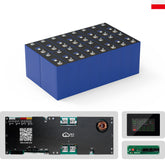¿Cómo se compara una batería de 12 V y 100 Ah con una batería de 1 kWh?
Comparación de una batería de 12 V y 100 Ah con una batería de 1 kWh
Al evaluar soluciones de almacenamiento de energía, especialmente para sistemas solares, vehículos recreativos o sistemas de energía de respaldo, surge una comparación frecuente: la batería de 12 V y 100 Ah frente a la de 1 kWh. Este artículo profundiza en sus diferencias, similitudes, aplicaciones y lo que necesita saber antes de tomar una decisión de compra. Al comprender las diferencias entre una batería de 12 V y 100 Ah y una de 1 kWh, puede garantizar que sus necesidades energéticas se satisfagan eficientemente.
- Comprensión de los conceptos básicos de una batería de 12 V y 100 Ah
- Comparación de la batería de 12 V 100 Ah con la batería de 1 kWh
- Diferencias clave entre una batería de 12 V y 100 Ah y una batería de 1 kWh
- Consideraciones de costos: ¿cuál ofrece más valor?
- Tamaño físico y portabilidad
- Química y seguridad de las baterías
- Casos de uso: ¿Qué batería es mejor para sus necesidades?
- Impacto ambiental y eliminación
- Rendimiento en el mundo real y estudios de casos
- ¿Cuál deberías elegir?
Comprensión de los conceptos básicos de una batería de 12 V y 100 Ah
¿Qué significa 12 V 100 Ah?
Una batería de 12 V y 100 Ah proporciona 12 voltios de potencial eléctrico y una capacidad de 100 amperios-hora. En resumen, esto significa que puede suministrar 100 amperios durante 1 hora, o 10 amperios durante 10 horas, y así sucesivamente. Esto se traduce en una capacidad total de almacenamiento de energía de 1,2 kilovatios-hora (12 voltios x 100 amperios-hora = 1200 vatios-hora).
Aplicaciones comunes
Las baterías de 12 V 100 Ah se utilizan comúnmente en:
sistemas de energía solar
Autocaravanas y furgonetas camper
Sistemas fuera de la red
Sistemas de energía de respaldo
Aplicaciones marinas
Estas baterías son versátiles y están ampliamente disponibles, con diversas químicas, como plomo-ácido, AGM, gel y fosfato de hierro y litio (LiFePO4).
Comparación de la batería de 12 V 100 Ah con la batería de 1 kWh
¿Una batería de 12 V 100 Ah equivale a 1 kWh?
No exactamente. Si bien una batería de 12 V y 100 Ah tiene una capacidad nominal de 1,2 kWh, la energía útil real puede variar según el tipo de batería. Por ejemplo, las baterías de plomo-ácido no deben descargarse por debajo del 50 %, lo que significa que solo ofrecen 0,6 kWh útiles. Por otro lado, las baterías de LiFePO4 pueden descargarse con seguridad hasta el 90-100 %, ofreciendo hasta 1,2 kWh de energía útil.
¿Qué es una batería de 1kWh?
Una batería de 1 kWh se refiere simplemente a un dispositivo de almacenamiento de energía capaz de almacenar 1000 vatios-hora. No especifica el voltaje ni la capacidad en amperios-hora, lo que la hace menos descriptiva sin conocer el voltaje y la química.
>>Vea también Cómo calcular los amperios hora que realmente necesita
Diferencias clave entre una batería de 12 V y 100 Ah y una batería de 1 kWh
Voltaje
La batería de 12 V y 100 Ah indica claramente su voltaje, mientras que una batería de 1 kWh puede ser de 12 V, 24 V, 48 V o superior. Esto afecta la compatibilidad con dispositivos y sistemas.
Capacidad energética
La batería de 12 V y 100 Ah tiene técnicamente 1,2 kWh, pero su capacidad útil varía. Se garantiza que una batería de 1 kWh tiene 1000 Wh, pero podría tener más según el diseño.
Eficiencia
Las baterías LiFePO4 de 12 V y 100 Ah suelen tener una eficiencia superior al 95 %, mientras que las baterías genéricas de 1 kWh pueden variar considerablemente. La eficiencia influye en la cantidad de energía almacenada que se puede utilizar realmente.
Consideraciones de costos: ¿cuál ofrece más valor?
Precio por vatio-hora
Una batería de 12 V y 100 Ah, especialmente los modelos de litio, puede costar entre $300 y $800. Esto supone un coste aproximado de entre $0,25 y $0,66 por vatio-hora. Un sistema de batería dedicado de 1 kWh podría costar más o menos, según la marca y las características.
Costos del ciclo de vida
Las baterías de litio de 12 V y 100 Ah suelen ofrecer entre 3000 y 5000 ciclos con una profundidad de descarga del 80 %, lo que las hace muy duraderas. Si la batería de 1 kWh también es de litio, puede ofrecer un rendimiento similar. Sin embargo, las baterías de menor calidad química pueden degradarse más rápidamente.
Tamaño físico y portabilidad
Dimensiones y peso
Una batería de litio de 12 V y 100 Ah suele pesar entre 9 y 13 kg y cabe en espacios reducidos. Una batería de 1 kWh puede pesar más o menos, dependiendo del voltaje y el tipo.
Facilidad de instalación
La batería de 12 V y 100 Ah es ampliamente compatible con inversores, controladores de carga y dispositivos existentes, lo que la convierte en una opción ideal para aficionados al bricolaje. La batería de 1 kWh podría requerir hardware específico.
Química y seguridad de las baterías
Litio vs. plomo-ácido
Las baterías de 12 V y 100 Ah vienen en diversas composiciones químicas. Las de LiFePO4 son más seguras, ligeras y eficientes. Las de plomo-ácido son más económicas, pero más pesadas y menos eficientes.
Sistemas de gestión de baterías (BMS)
Una batería de 12 V 100 Ah de alta calidad generalmente incluye un BMS para evitar la sobrecarga, el sobrecalentamiento y la descarga profunda. Las baterías de 1 kWh pueden incluir o no protecciones similares.
Casos de uso: ¿Qué batería es mejor para sus necesidades?
Para almacenamiento solar
Una batería de 12 V y 100 Ah es ideal para instalaciones solares pequeñas y medianas. Se integra bien con sistemas de 12 V y proporciona un almacenamiento fiable.
Para energía de respaldo
Ambas opciones funcionan, pero una batería de 12 V 100 Ah es más fácil de integrar con el hardware existente.
Para aplicaciones marinas y de vehículos recreativos
La batería de 12 V 100 Ah es la preferida debido a su factor de forma, peso y compatibilidad con los sistemas de 12 V utilizados en vehículos recreativos y barcos.
Impacto ambiental y eliminación
Sostenibilidad
Las baterías de litio de 12 V y 100 Ah tienen una mayor vida útil, lo que reduce los residuos. Son más ecológicas que las de plomo-ácido.
Opciones de reciclaje
Están surgiendo más programas de reciclaje de baterías de litio. Su correcta eliminación garantiza la seguridad ambiental.
>>Vea también Por qué debería considerar invertir en una caja de batería La guía definitiva para soluciones de almacenamiento de baterías
Rendimiento en el mundo real y estudios de casos
Reseñas y testimonios de clientes
Muchos usuarios reportan un excelente rendimiento de las baterías de 12 V y 100 Ah en cabañas aisladas de la red eléctrica, vehículos recreativos y entornos marinos. La energía útil, la vida útil y la confiabilidad son puntos comunes de elogio.
Comparaciones de campo
Las pruebas muestran que una batería de 12 V 100 Ah de alta calidad a menudo supera a las unidades genéricas de 1 kWh en términos de confiabilidad, suministro de energía y vida útil.
¿Cuál deberías elegir?
En definitiva, una batería de 12 V y 100 Ah ofrece información más detallada, mejor integración con los sistemas existentes y, a menudo, mayor fiabilidad. Si la comparamos con una batería genérica de 1 kWh sin especificaciones de voltaje ni composición química, la batería de 12 V y 100 Ah suele ser la mejor en transparencia, compatibilidad y uso práctico.
Ya sea que alimente un sistema solar, una autocaravana o una embarcación, la batería de 12 V y 100 Ah es una opción versátil y confiable. Técnicamente, puede proporcionar 1,2 kWh, pero su usabilidad y practicidad la hacen más que simples cifras.
En resumen, la batería de 12 V y 100 Ah es más que comparable a una de 1 kWh; a menudo la supera en valor, rendimiento y satisfacción del usuario. Elija con cuidado según los requisitos de su sistema, pero tenga la seguridad de que la batería de 12 V y 100 Ah sigue siendo un referente en almacenamiento de energía portátil.
Como hemos explorado a fondo, comparar una batería de 12 V y 100 Ah con una de 1 kWh revela diferencias cruciales que pueden afectar su solución energética. Considere siempre su caso de uso específico, pero para muchos, la batería de 12 V y 100 Ah destaca como la mejor opción tanto en claridad como en capacidad.
























Leave a comment
All blog comments are checked prior to publishing